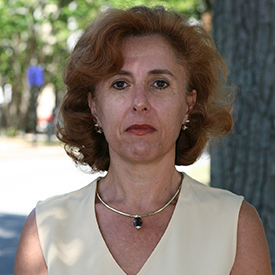Bachelor of Science in Medical Imaging Sciences
Discover Your Future in Medical Imaging
Are you fascinated by healthcare and technology? Do you want to make a real difference in patient care-without becoming a doctor or nurse? The B.S. in Medical Imaging Sciences at Georgian Court University (GCU) could be the perfect fit for you.
This joint-degree program, offered in partnership with the Rutgers University School of Health Professions, prepares you for a high-demand career in medical imaging. You’ll gain hands-on experience, study cutting-edge medical technology, and graduate ready to step into one of the fastest-growing fields in healthcare.
What Is Medical Imaging Sciences?
Medical Imaging Sciences is all about using advanced ultrasound technology to help doctors diagnose and treat patients. Professionals in this field are at the heart of modern healthcare, providing the sonography images and data that guide life-saving decisions.
Why Study Medical Imaging at Georgian Court University?
Support Every Step of the Way
From your first day on campus to graduation, you’ll find advisors and mentors who are truly invested in your academic and personal success.
Hands-On Learning Opportunities
Our program emphasizes real-world experience, so you’ll have plenty of chances to practice your skills in labs and clinical settings before you graduate.
Collaborative Campus Culture
At GCU, you’ll join a diverse community where students work together, share ideas, and build lasting friendships inside and outside the classroom.
Pathways to Professional Growth
With guidance on internships, certification, and career planning, you’ll be prepared to take the next step-whether that’s entering the workforce or pursuing further education.
B.S. in Medical Imaging Sciences Program Highlights
Joint Degree Advantage
- Dual Credentials: Graduate with a Bachelor of Science in Medical Imaging Sciences and a minor in Biology awarded by both Georgian Court University and Rutgers University-a powerful combination that stands out to employers.
- Specialization Options: Choose the path that fits your interests and career goals: Cardiovascular Sonography or Diagnostic Medical Sonography.
- Real-World Clinical Experience: Get hands-on training at leading hospitals and imaging centers throughout New Jersey and the surrounding region, preparing you for immediate entry into the workforce.
The GCU Experience
- Personalized Support: With an 11:1 student-to-faculty ratio, you’ll receive individual attention and mentoring from professors who care about your success.
- Generous Financial Aid: 99% of freshmen receive financial assistance, with an average award of over $39,000-making your education more affordable.
- Prime Location: Study in Lakewood, NJ, just a short drive from the Jersey Shore, New York City, and Philadelphia, giving you access to top healthcare employers and vibrant city life.
High-Demand Careers in Medical Imaging
A Bachelor of Science in Medical Imaging Sciences from Georgian Court University and Rutgers opens the door to a wide range of rewarding healthcare careers. Medical imaging professionals are essential members of the healthcare team, using advanced technology to help diagnose, monitor, and treat patients.
Diagnostic Medical Sonographer
- What They Do: Operate ultrasound equipment to produce images of organs and tissues, assisting physicians in diagnosing medical conditions.
- Median Salary (2024): $84,410 per year
- Job Growth: Projected to grow 10% from 2022 to 2032-much faster than average for all occupations.
- Work Settings: Hospitals, outpatient care centers, physician offices, diagnostic laboratories.
Cardiovascular Sonographer (Echocardiographer)
- What They Do: Specialize in imaging the heart and blood vessels to help diagnose cardiovascular conditions.
- Median Salary (2024): $78,210 per year
- Job Growth: Projected at 10% over the next decade.
- Work Settings: Hospitals, heart and vascular centers, clinics, private practices.
Obstetric Sonographer
- What They Do: Specialize in imaging the fetus, placenta, and amniotic fluid during pregnancy to monitor fetal development and detect abnormalities.
- Median Salary (2024): $82,790 per year
- Job Growth: Projected at 10% over the next decade.
- Work Settings: Hospitals, obstetrician offices, maternal-fetal medicine centers, prenatal clinics.
Why Choose a Career in Medical Imaging?
- Competitive Salaries: Most roles offer salaries well above the national average for all occupations.
- Job Security: The aging population and advances in medical technology are driving demand for skilled imaging professionals.
- Flexible Work Environments: Opportunities exist in hospitals, clinics, research labs, and even mobile imaging units.
- Meaningful Work: You’ll play a vital role in patient care and diagnosis, making a real impact every day.
Certification and Advancement
Graduates are prepared to sit for national certification exams, such as those offered by the American Registry for Diagnostic Medical Sonography (ARDMS) or Cardiovascular Credentialing International (CCI). With experience, medical imaging professionals can advance into supervisory, educational, or specialized clinical roles.
Local and Regional Opportunities
With GCU’s prime location near the Jersey Shore, New York City, and Philadelphia, graduates have access to some of the nation’s top hospitals and healthcare employers-including Hackensack Meridian Health, RWJBarnabas Health, and Penn Medicine.
Sources:
- U.S. Bureau of Labor Statistics, Occupational Outlook Handbook (2024–2025): Diagnostic Medical Sonographers, MRI Technologists, Radiologic Technologists
Program Overview
The Medical Imaging Sciences program is a 3+1 joint-degree track:
- Years 1–3 at GCU: Complete foundational science courses (earning a minor in biology) and general education requirements.
- Apply to Rutgers: In your junior year, apply to the Rutgers School of Health Professions and select your specialty.
- Specialty Training at Rutgers: Spend 15–18 months at Rutgers (Newark or Scotch Plains campuses) focusing on your chosen field.
- Graduate with a B.S.: Upon completion, , you’ll receive a Bachelor of Science in Medical Imaging Sciences and a minor in Biology-jointly awarded by GCU and Rutgers.
Specializations Available:
- Cardiovascular Sonography: Learn to use ultrasound to assess heart and blood vessel health.
- Diagnostic Medical Sonography: Become an expert in general and specialized ultrasound imaging.
Note: Acceptance to Rutgers is competitive. See admission requirements below.
What Will You Learn?
- Core Sciences: Biology (including Anatomy and Physiology), Chemistry, and Physics.
- Imaging Technology: Hands-on experience with the latest medical imaging equipment.
- Patient Care: Learn to work directly with patients and healthcare teams.
- Clinical Rotations: Real-world experience in hospitals and clinics, building your skills and professional network.
Admission Requirements
- Minimum GPA of 2.85 (higher preferred)
- No grade lower than a C in required science courses
- Minimum B- in Human Anatomy & Physiology I and II
- Application to Rutgers School of Health Professions in junior year (consult your advisor for details)
Meeting minimum requirements does not guarantee admission to Rutgers. Some courses may be offered online.
Why Choose GCU?
-
Close-Knit Campus
Small classes, supportive professors, and a beautiful campus environment. -
Prime Location
Study near the Jersey Shore with access to opportunities in New York City and Philadelphia, both just one hour from campus. -
Financial Support
99% of undergraduate students receives financial aid. -
Career Connections
Our partnership with Rutgers and proximity to major healthcare centers give you a head start on your career.
Shape Your Future in
Medical Imaging
Need to
learn more?
Frequently Asked Questions
Q: What is the difference between cardiovascular and diagnostic medical sonography?
A: Cardiovascular sonography focuses on imaging the heart and blood vessels, while diagnostic medical sonography covers a broader range of organs and tissues and also includes monitoring fetal health during pregnancy.
Q: Where will I complete my clinical rotations?
A: Clinical placements are arranged through Rutgers at top hospitals and imaging centers in New Jersey and the surrounding region.
Q: Will I be eligible for certification after graduation?
A: Yes! Graduates are prepared to sit for national certification exams in their chosen specialty.
Q: Can transfer students apply?
A: Absolutely. We welcome transfer students and will work with you to maximize your eligible credits.
Medical Imaging Sciences Program Information
B.S. in Medical Imaging Sciences Curriculum
The B.S. in Medical Imaging Sciences is a joint-degree program with the Rutgers University School of Health Professions in Newark and Scotch Plains. At GCU, students take a specific set of science courses leading to a minor in biology, and complete the general education (physical education, humanities, and social sciences) requirements at GCU. This typically adds up to a total of 85 or more GCU credits. In the fall of the junior year (consult with advisor and Rutgers University website for deadline date), the student applies to the Rutgers University’s School of Health Professions. The student chooses one of the following specialties: cardiovascular sonography or diagnostic medical sonography. If accepted, the student spends 15 to 18 months taking the specialized courses (46–50 credits) in the field of study at Rutgers University. At the conclusion of the period of study at Rutgers University, the student earns a Bachelor of Science in Medical Imaging Sciences, jointly awarded by GCU and Rutgers University. Students pay GCU tuition and fees while enrolled at GCU, and Rutgers University tuition and fees while enrolled at Rutgers University.
GCU does not guarantee acceptance into any Rutgers University program. Rutgers University generally expects applicants to have earned no grade lower than a C in the required science courses and no lower than a B- in BI213 Human Anatomy & Physiology I and BI214 Human Anatomy & Physiology II and to have a minimum GPA of at least 2.85 (requirements subject to change). Meeting or exceeding the minimum GPA does not guarantee acceptance into the Rutgers University program. Some Rutgers University courses are taught online.
To earn this degree, students must successfully complete at least 120 credits, including General Education requirements and the major requirements below.
Medical Imaging Sciences Major with a Minor in Biology (Requirements for All Specializations)
| Code | Title | Credits |
|---|---|---|
| Biology | ||
| BI121 | Cellular Organiz., Energetics & Function | 4.0 |
| BI204 | Genetics & Evolution | 4.0 |
| BI213 | Human Anatomy & Physiology I | 4.0 |
| BI214 | Human Anatomy & Physiology II | 4.0 |
| Select one of the following: | 3.0-4.0 | |
BI219 | Microbiology | |
BI275 | Pathophysiology 1 | |
BI320 | Cell Biology | |
BI407 | Neurobiology | |
BI422 | Advanced Molecular Genetics | |
BI427 | Immunology | |
or BI428 | Fundamentals of Immunology | |
BI437 | Biochemistry I | |
BI490 | Developmental Biology | |
| Biology elective 2 | 4.0 | |
| Chemistry | ||
| CH113 | General Chemistry I | 4.0 |
| CH114 | General Chemistry II | 4.0 |
| CH223 | Organic Chemistry I | 4.0 |
| Health Related Professions | ||
| HRP200 | Medical Terminology | 3.0 |
| Mathematics | ||
| Select one of the following: | 3.0-4.0 | |
MA109 | College Algebra | |
MA110 | Precalculus | |
MA115 | Calculus I | |
MA116 | Calculus II | |
| Physics | ||
| Select one of the following sequences: | 8.0 | |
PH111 & PH112 | Physics in Everyday Life I and Physics in Everyday Life II | |
PH115 & PH116 | College Physics I and College Physics II | |
PH121 & PH122 | University Physics I and University Physics II | |
| Statistics | ||
| Select one of the following: | 3.0 | |
BI203 | Experimental Design & Statistics | |
MA103 | Introduction to Statistical Thinking | |
PS430 | Rsrch Mthds & Stats for the Beh Sciences | |
SO201/CJ202 | Social and Crime Statistics | |
| Total Credits | 52.0-54.0 | |
- 1
Recommended for students in the Medical Imaging Sciences major
- 2
One of the nine courses in the preceding list is recommended. BI422 Advanced Molecular Genetics is highly recommended.
Recommended electives, particularly for students planning to seek an advanced degree in science: CH224 Organic Chemistry II and MA116 Calculus II. All of the preceding required courses must be completed prior to entry into the Rutgers University portion of the program.
For more information on program requirements, consult the Undergraduate Catalog.
Department of Biology Faculty

Carolyn A. Bergman, Ph.D.
Associate Professor & Chair of Biology
School of Arts, Sciences, and Education
Jeffries Hall (203)
cbergman@georgian.edu
732-987-2372

Brunella Bowditch, Ph.D.
Associate Professor of Biology
School of Arts, Sciences, and Education
Jeffries Hall (202)
bbowditch@georgian.edu
732-987-2377

Michael F. Gross, Ph.D.
Professor of Biology
School of Arts, Sciences, and Education
Jeffries Hall (112)
mgross@georgian.edu
732-987-2373

Jessica A. Lisa, Ph.D.
Assistant Professor of Biology
School of Arts, Sciences, and Education
Jeffries Hall
jlisa@georgian.edu

Jean Parry, Ph.D.
Associate Professor
School of Arts, Sciences, and Education
Jeffries Hall (136)
jparry@georgian.edu
732-987-2370
Related Programs
Biology, B.S.
Explore the science of living organisms, from cells and genetics to ecosystems, preparing for careers in research, healthcare, or graduate study.
Biochemistry, B.S.
Combine biology and chemistry to understand the molecular basis of life, laying the groundwork for careers in medicine, pharmaceuticals, or laboratory research.
Chemistry, B.S.
Study the properties and reactions of matter, gaining hands-on laboratory experience that prepares you for work in healthcare, industry, or advanced study.
Health Sciences, B.S.
Gain a broad foundation in health, wellness, and disease, with flexible pathways to careers in healthcare administration, health education, or allied health professions.
Nursing, B.S.N.
Prepare for a rewarding career as a registered nurse through a rigorous curriculum that combines classroom learning with extensive clinical experience.
Psychology, B.A.
Examine human behavior and mental processes, developing skills for careers in counseling, social services, or further graduate study.
Exercise Science, Wellness & Sports, B.S.
Focus on human movement, fitness, and health promotion, preparing for roles in exercise physiology, wellness coaching, or sports management.
Clinical Laboratory Sciences, B.S. (Joint program with Rutgers SHP)
Train to become a clinical laboratory scientist, performing diagnostic tests that are vital to patient care in hospitals and medical labs.
Ready to take the next step? Request more information or start your application today and discover where a Bachelor of Science in Medical Imaging Sciences from Georgian Court University can take you.
Have questions? Contact us
Georgian Court University
900 Lakewood Avenue
Lakewood, NJ 08701
Campus Map
Contact Information
Office of Undergraduate Admissions
Phone: 732-987-2700
E-mail: admissions@georgian.edu
Office Hours
- Monday-Friday: 8:30 a.m. – 4:30 p.m.
- Saturday: *By appointment only
- Sunday: Closed
*Check tour schedule for specific dates/times.
